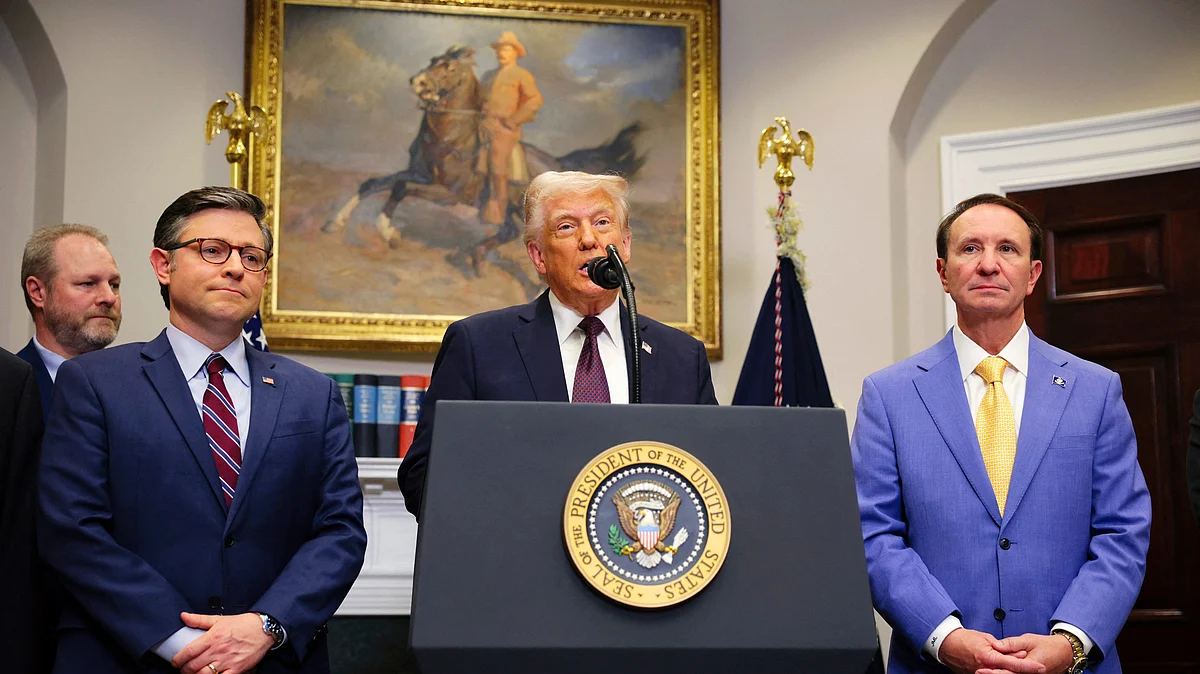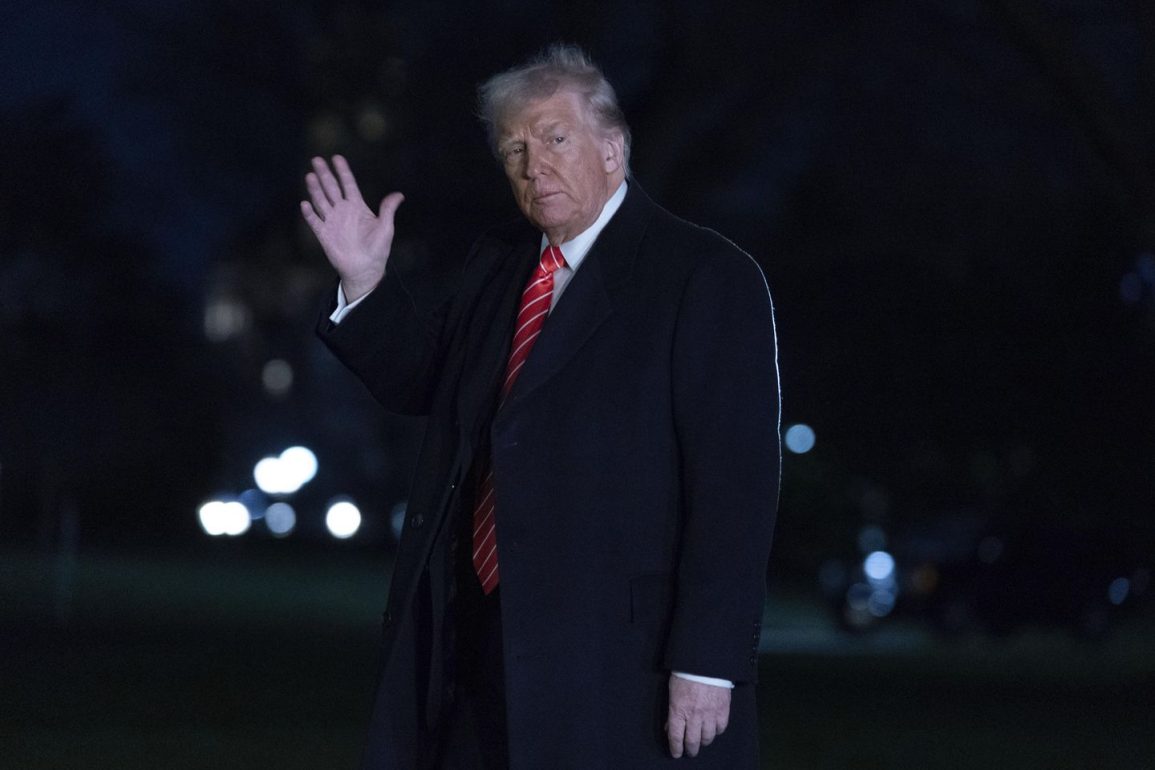President Donald Trump signed a broad executive order on Tuesday aimed at overhauling U.S. elections. The order mandates documentary proof of citizenship for voter registration in federal elections and requires all ballots to be received by Election Day.
The directive asserts that the U.S. has failed “to enforce basic and necessary election protections,” urging states to collaborate with federal agencies to share voter lists and prosecute election-related crimes. It also warns that states failing to comply may face cuts to federal funding.
Trump has frequently alleged election rigging, often making such claims even before results are announced. Since his loss to Democrat Joe Biden in 2020, he has persistently opposed specific voting methods, attributing his defeat to widespread fraud, despite the lack of supporting evidence.
Latest Developments:
American Oversight, a government transparency group, has filed a lawsuit claiming that official messages sent via the encrypted messaging app Signal should be preserved as federal records under the Federal Records Act.
The lawsuit asserts that Signal’s automatic deletion feature and the lack of backups on company servers make its use for official government communication improper.
The lawsuit also names intelligence officials, including Director of National Intelligence Tulsi Gabbard and CIA Director John Ratcliffe, among others.
Meanwhile, as reports surfaced about Trump’s national security adviser mistakenly adding a journalist to a group chat discussing military operations, Republican voters in Florida largely dismissed the controversy.
“I think it was a faux pas, and it was a mistake that somebody made,” said Gary Caples, a Republican voter in DeLand, Florida. “Nobody’s perfect.”
Zelma Cohen, vice president of the West Volusia Republican Party, noted that early voters in the district hadn’t mentioned the report. She downplayed the Washington reaction, saying, “They get excitable about everything.”
The relatively subdued Republican response reflects a broader trend where incidents that might have previously sparked bipartisan outrage are increasingly dismissed as minor missteps. Trump’s firm stance, supported by his allies, has reinforced this attitude.
U.S. Allies React to Signal Security Breach:
The accidental inclusion of a journalist in a group chat discussing military strikes against Yemen’s Houthis has raised alarms among U.S. allies, who view the incident as a major security lapse.
Neil Melvin, a security expert at the Royal United Services Institute, described it as “pretty shocking.” A European diplomat, speaking anonymously, called the breach “scary” and “reckless.”
Despite these concerns, European officials publicly maintain that their trans-Atlantic relations remain strong.
Legal Challenges and Political Fallout:
Yunseo Chung, a 21-year-old lawful permanent resident, filed a lawsuit against the Trump administration on Monday, alleging that immigration authorities moved to deport her as retaliation for participating in a pro-Palestinian protest.
Her lawsuit argues that the government is “attempting to use immigration enforcement as a bludgeon to suppress speech that they dislike.”
A U.S. District Judge ruled that the government had not provided sufficient evidence to justify detaining Chung.
In response, the Department of Homeland Security issued a statement saying Chung had “engaged in concerning conduct,” including her arrest at the protest.
Security and Political Repercussions:
The National Security Leaders for America, a coalition of former high-ranking military and intelligence officials, condemned the use of Signal for discussing classified war plans, stating that it demonstrated a “remarkable disregard for operational security.”
House Democratic Leader Hakeem Jeffries has called for Trump to dismiss Defense Secretary Pete Hegseth over the incident. In a letter to Trump, Jeffries wrote that Hegseth “threatens the nation’s security and puts our brave men and women in uniform throughout the world in danger.”
Hegseth, however, has remained defiant, and despite some Republican criticism, none have called for his removal.
Election Security and Trump’s Executive Order:
Trump’s executive order requires documentary proof of citizenship for federal voter registration and mandates that ballots must be received by Election Day.
It asserts that the U.S. has failed to enforce election protections and demands states share voter lists with federal agencies while cracking down on election crimes. States that do not comply risk losing federal funding.
Trump has long criticized the election process and has indicated that further election-related measures will be announced in the coming weeks.
Legal Challenges Against Law Firms:
Trump has targeted the law firm Jenner & Block in an executive order, citing the past employment of an attorney who worked on Robert Mueller’s special counsel investigation into Trump’s 2016 campaign.
This order follows similar actions against law firms such as Covington & Burling, Perkins Coie, and Paul Weiss. It threatens to suspend security clearances and terminate federal contracts.
Transgender Military Ban:
A case challenging Trump’s ban on transgender military service members remains in court. Several long-serving transgender troops argue that the policy is discriminatory and would severely damage their careers.
A Justice Department lawyer defended the policy, arguing that the president has broad discretion over military affairs. The presiding judge noted that the government had provided no evidence that transgender troops harm military readiness.
A final ruling is expected by Thursday.
Medal of Honor Day:
Trump marked Medal of Honor Day by speaking with recipients of the nation’s highest military honor at the White House.
“We’ll do it again,” he said. “I like to do it, I feel good. I feel brave among you people.”
The National Medal of Honor Museum was set to open in Arlington, Texas, highlighting the service of over 3,500 Medal of Honor recipients from the Civil War to the present.

Greenland and U.S. National Security:
Senator J.D. Vance announced he would join his wife, Usha Vance, on a visit to Greenland.
Trump has previously expressed interest in the U.S. acquiring Greenland, citing national security concerns.
White House officials confirmed Usha Vance was visiting Greenland for a national dogsled race, while Rep. Mike Waltz and Energy Secretary Chris Wright were scheduled to visit a U.S. military base in the region.
HUD Grants and DEI Policy:
A federal judge temporarily halted the Trump administration’s decision to revoke millions in fair housing grants for nonprofits that enforce anti-discrimination laws.
The judge’s decision comes after HUD terminated over 60 grants, citing executive orders against funding programs incorporating diversity, equity, and inclusion (DEI) language.
Trump on Signal Breach:
Commenting on the Signal security breach, Trump remarked, “One of the prices you pay when you’re not sitting in the Situation Room with no phones on, which is always best.”
He indicated that while an FBI investigation was unlikely, the matter would be reviewed.
Trump’s Portrait Controversy in Colorado:
A portrait of Trump, commissioned by Colorado Republicans, was removed from the State Capitol following the former president’s public criticism of it. The portrait is now in storage, and plans for a replacement remain unclear.
Crackdown on Sanctuary Cities:
Trump has hinted at executive action targeting “sanctuary cities,” which limit cooperation with federal immigration authorities. He suggested that an order addressing the issue could be imminent.
Investigations into National Security Leaks:
Senate Democratic Leader Chuck Schumer is pushing for a full Senate investigation into how a journalist was added to a secure Signal chat discussing military plans.
Senate Republicans, however, argue that the Trump administration’s intelligence officials are already facing scrutiny in ongoing hearings.
Trump’s Criticism of PBS and NPR:
Trump expressed a desire to defund PBS and NPR, calling them “very unfair” and “very biased.”
Texas Governor Controversy:
Democratic Rep. Jasmine Crockett faced backlash for referring to Texas Governor Greg Abbott, who uses a wheelchair, as “Governor Hot Wheels.”
Trump’s Latest Executive Actions:
Trump signed an executive order centralizing government payments through the Treasury Department, arguing that paper checks should have been phased out decades ago.


